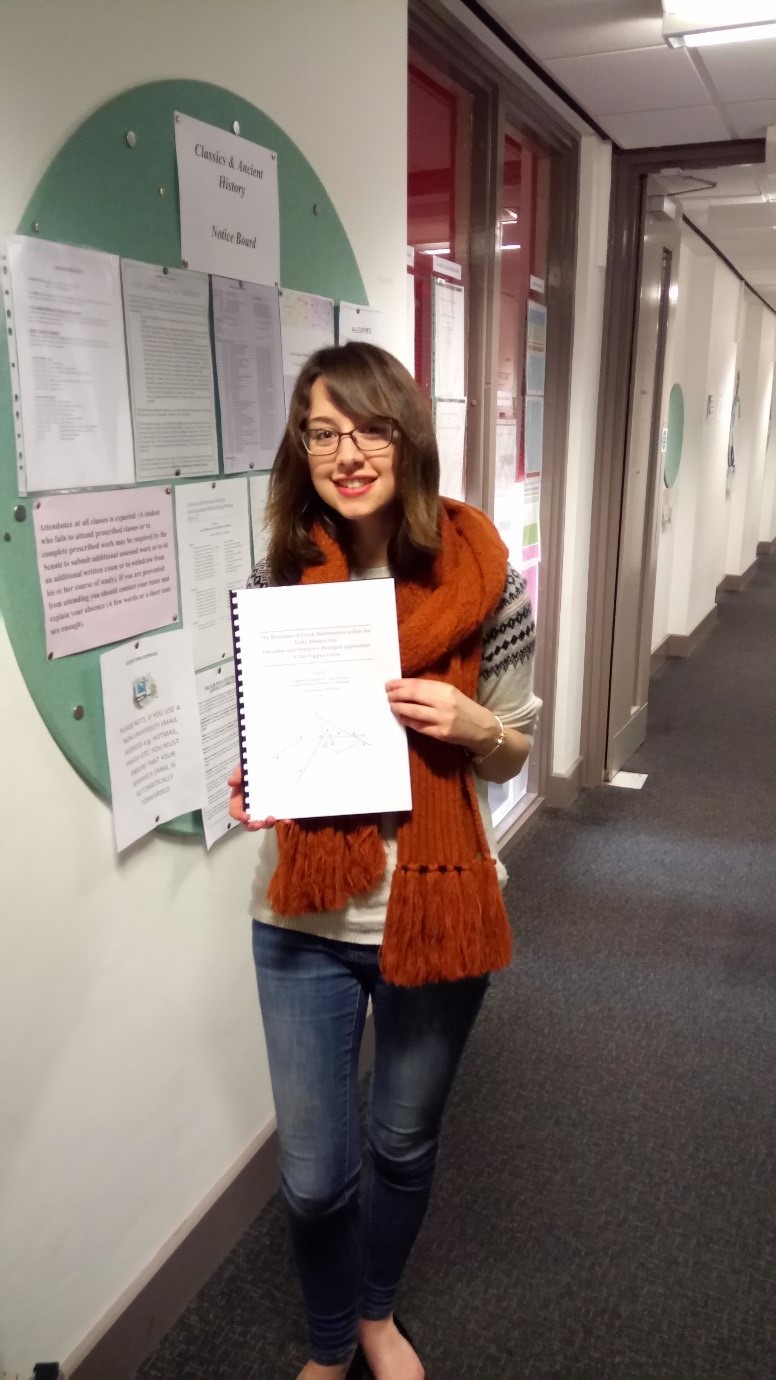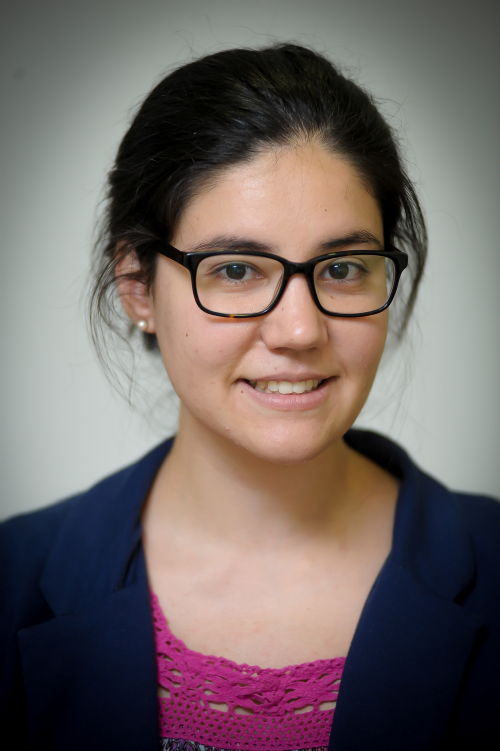Alumni Spotlight, August 2017
Paige Truelove and Desiree Arbo:
Paige Truelove
Paige graduated in July 2017 and was awarded the prize for the best dissertation for the year group. Here she tells us about the dissertation and her plans for the future:
The dissertation covered the topic of ancient Greek mathematics, specifically geometry. Its purpose was to examine the reception of Greek mathematics in the Early Modern era, by focusing upon a single, ancient Greek geometrical locus problem, entitled: “the three and four line locus” or the “Pappus Problem” as it is more commonly known, due to its formal survival in Pappus of Alexandria’s mathematical treatise – his Collection. The dissertation explored how the Pappus locus was studied by some of History’s most renowned mathematicians, notably: Euclid, Apollonius, Pappus of Alexandria, René Descartes and Isaac Newton, and closely examined all the mathematical texts of these historical figures.
The beginning of Chapter I examined the origins of the locus problem with both Euclid and Apollonius. The second half of the first chapter analysed Pappus’ own, yet incomplete solution to the locus problem and the apparent confusion amongst modern scholarship regarding the issue of the extent to which Pappus provided a complete and satisfactory solution to the locus problem.
Chapters II and III examined the mathematical debate between Descartes and Newton regarding the appropriate methodology to be used to forge a solution to the Pappus locus. Although the Pappus locus is but one geometrical problem within the entire span of the history of geometry, its significance is immense, as it afforded Descartes the opportunity to introduce a new, alternative form of traditional Euclidean geometry, Analytic geometry, which, as explored in Chapter II, carved the path for the beginnings of modern mathematics, and which broke away from the traditional mathematical models transmitted by the ancient Greeks. Chapter III explored Newton’s solution to the Pappus problem, and how he sought to solve the locus by relying upon purely traditional Greek geometrical methodology. I provided in depth analysis of the stark differences between the contrasting mathematical approaches to the Pappus locus of both Descartes and Newton.
The dissertation also considered more general issues regarding the constant tension within the Early Modern era between the need to discontinue the classical mathematical tradition, and a lasting fascination for the mathematical, specifically geometrical works of the Greeks. Notably, a theme central to this work was that of the notion of the Greek mathematical legacy. I concluded that the development of modern, Western mathematics, specifically the discipline of geometry within mathematics, is indebted to the ancient Greeks, particularly individuals such as Euclid, Apollonius and Pappus. I also stressed my belief that the Pappus problem and its survival within Greek mathematical works is fundamental to the development of modern Western mathematics and geometry, and that the Pappus locus should continue to be studied and appreciated.
In my final year, I elected to study two interdisciplinary modules, entitled “Challenges of Climate Change” and “Achieving Sustainability.” After realising how much of a planetary crisis climate change is and discovering that I am highly interested in the topic, I applied for a Masters in climate change. In September, I will be moving on to study for an MSc in Climate Change at King’s College London. After completing my Masters, I am hoping to pursue a career as an Environmental Consultant.
Desiree Arbo
Desiree was a PhD student from 2012-2017, co-supervised by the Classics & Ancient History Department. Here she tells us about her research at Warwick University and her plans for the future:
My PhD thesis explored the functions of classical learning in colonial Paraguay between 1750 and 1815. My research centred primarily on the legacy of the Society of Jesus (Jesuits) as authors of Latin literature, as educators, and as missionaries to the Guarani Indians. Under the co-supervision of Professor Andrew Laird (Classics) and Professor Rebecca Earle (History), I proposed and implemented an interdisciplinary approach that combined classical reception and historical methods, including archival research in South America. The thesis examined different ways in which classical influences are discernible: in the works of the Jesuit José Manuel Peramás (1732-1793), in colonial classrooms and library inventories of Asunción and Córdoba, and in the political discourse of Paraguayan independence. Overall, my thesis demonstrated that transformations in the uses of Latin reflected broader intellectual trends in the transition from the colonial to independent periods which help explain the initial construction of national identities in Paraguay.
During my time at Warwick I was also able to participate in activities across the Arts Faculty, particularly in the Department of History and the Centre for the Study of the Renaissance. In Spring 2016 I was awarded a visiting studentship at Johns Hopkins University as part of the project ‘Antiquity and its Uses: Renewal and Reception’ between Hopkins and the Centre for the Study of the Renaissance at Warwick. This project was crucial to help me think about ways to approach reception in my future research. I am currently an early career fellow at the Institute of Advanced Studies at the University of Warwick, and will be taking up a fellowship at the Ludwig Boltzmann Institute for Neo-Latin Studies in 2018.



